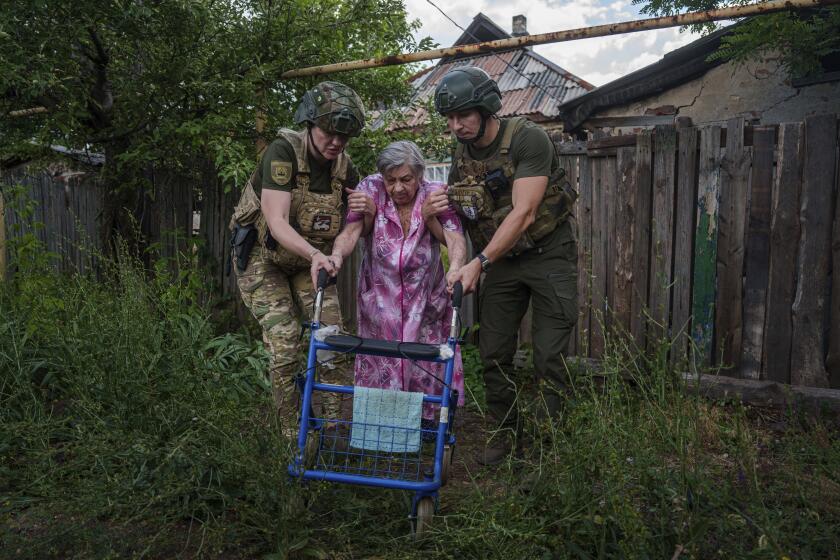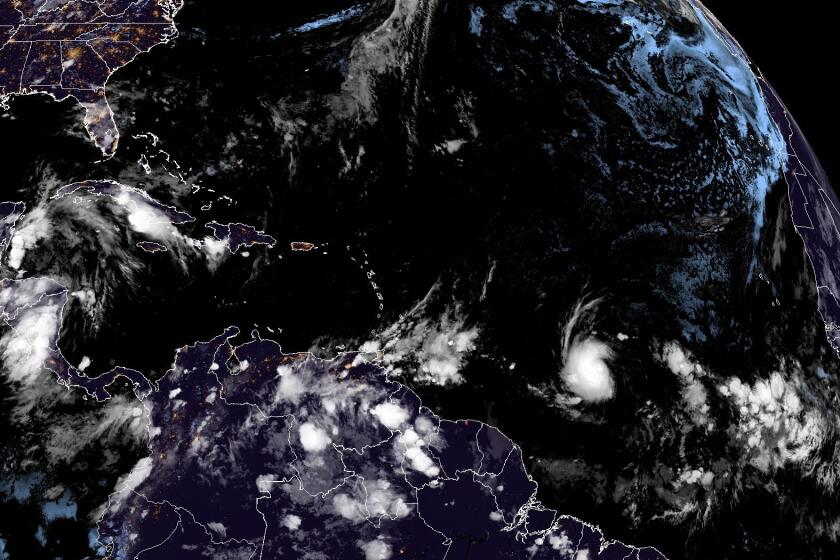U.S., Japan OK Pact on Military Crime Suspects
In a major move to calm a national uproar here against American military bases, the United States agreed Wednesday to new criminal procedures allowing Japanese to gain early custody of U.S. military suspects in rape and murder cases.
The agreement was hammered out seven tense weeks after a 12-year-old girl was brutally beaten and raped, allegedly by three U.S. servicemen, on the southern island of Okinawa. The crime sparked the largest demonstrations against American bases in Okinawa’s history--as many as 85,000 people rallied there Saturday--and led to fears that the U.S.-Japanese security alliance itself could be badly shaken.
In another development Wednesday, U.S. military officials claimed that Japanese authorities have quietly persuaded 34 of 35 holdout landowners to renew leases on eight American military facilities on Okinawa. Okinawa Gov. Masahide Ota had backed up the dissenting landowners by refusing to override them and sign the leases himself, and his support was a crucial factor in elevating the local crime into a national security issue.
The developments are expected to help soothe public anger and clear the way for President Clinton’s visit here next month to reaffirm the importance of U.S.-Japanese security ties.
“Compared to procedures until now, this agreement is an improvement that reflects the concern among Japanese people,” Foreign Minister Yohei Kono said Wednesday in announcing the accord on criminal procedures.
Under a 1960 bilateral security agreement, U.S. military suspects are allowed to remain in American hands until indicted by Japanese authorities. But after the Sept. 4 rape, as false rumors flew that the three suspects were freely roaming the base enjoying hamburgers while the schoolgirl was hospitalized with severe injuries, Okinawan authorities demanded immediate custody.
*
In a crescendo that stunned U.S. officials, the uproar swept to the Japanese mainland, prompting heated media coverage, political faltering even by conservative allies and resolutions from more than 150 local assemblies demanding changes in the criminal procedures.
The new accord establishes a procedure under which the Japanese can, for the first time, request early custody of suspects. In turn, the United States pledged to give “sympathetic consideration” to such requests in cases of rape and murder and “take full account” of Japan’s views in other criminal cases.
The accord gives Japan the same process afforded Germany, resolving a major complaint that Tokyo was receiving unequal treatment compared to America’s European allies.
However, some lawyers fear that turning Americans over to the Japanese before formal charges are filed could invite abusive interrogation and forced confessions--problems that plague the criminal justice system here.
“The Japanese system offers less protection in terms of rights,” said Mitsunobu Matsunaga, the Japanese attorney for Marine Pfc. Rodrico Harp, one of the three rape suspects. Japanese police are not required to inform suspects of their right to remain silent, do not allow attorneys to be present during interrogation and may question a suspect at any hour of the day or night, he said.
“The question I want to ask is whether the Japanese side is ready to take care of these [human rights] issues.”
A U.S. military source said the original system of keeping U.S. suspects until after indictment was aimed at “maintaining a little more oversight” to account for differences in cultures and court systems. But he added, “If this is what the governments have agreed to, then if [suspects] violate the law, unfortunately they have to pay the penalty.”
The source said progress has also been made on the land leases on Okinawa, which houses 75% of the U.S. facilities in Japan even though it accounts for just 0.3% of total national territory.
In a crucial move that forced Tokyo to take up Okinawa’s complaints--which have long been ignored by the mainland--Ota refused to sign documents forcing 35 anti-base landowners to renew leases due to expire next spring. Their land represents just a tiny fraction of the 31,521 leases for land housing U.S. military facilities, but they include such locations as the Sobe Communication Site, an important listening post.
*
If Tokyo has indeed succeeded in persuading all but one holdout to renew the leases, it will reduce Ota’s leverage in pushing his other demands, such as a reduction in bases. In the past few days, he has signaled a willingness to compromise and is scheduled to meet Prime Minister Tomiichi Murayama on Nov. 4.
The issue illustrates how the unusual state of Japanese politics has helped create a climate in which the controversy bloomed. In 1991, in what he called the most difficult decision of his life, Ota forcibly renewed most of 2,636 leases held by anti-base landowners. The reason: The conservative Liberal Democrats firmly ruled the government then and made national aid to Okinawa--the poorest prefecture in Japan--contingent on the lease renewals.
But, in a historical quirk, the current prime minister, Murayama, is a Socialist who has refused to take strong measures against Ota to force him to sign.
*
As a result, the rape case became entangled with the lease issue, creating a national fervor that has allowed Ota to press aggressively for base reductions. With a weakened LDP now reduced to sharing power with the Socialists and a third party, and crucial general elections expected next year, virtually no politicians have stepped forward to argue the case for the U.S. bases.
Still, the United States and Japan in May came to agreement on two of Ota’s three major demands: relocation of the Yomitan airfield and the Naha military port to other areas. The relocation of artillery training from areas around a highway remains under negotiation.
The Japanese government will also ask the United States to shut down two additional military facilities and partially close another, which Ota also favors, the Japan Times reported today.
U.S. Defense Secretary William J. Perry said in an interview Wednesday that Washington has no plans to bring home any of the 29,000 U.S. troops now stationed on Okinawa. Overall, the United States has 100,000 troops in Asia--including Japan and South Korea.
* Times staff writer Art Pine in Washington contributed to this report.
More to Read
Start your day right
Sign up for Essential California for news, features and recommendations from the L.A. Times and beyond in your inbox six days a week.
You may occasionally receive promotional content from the Los Angeles Times.







